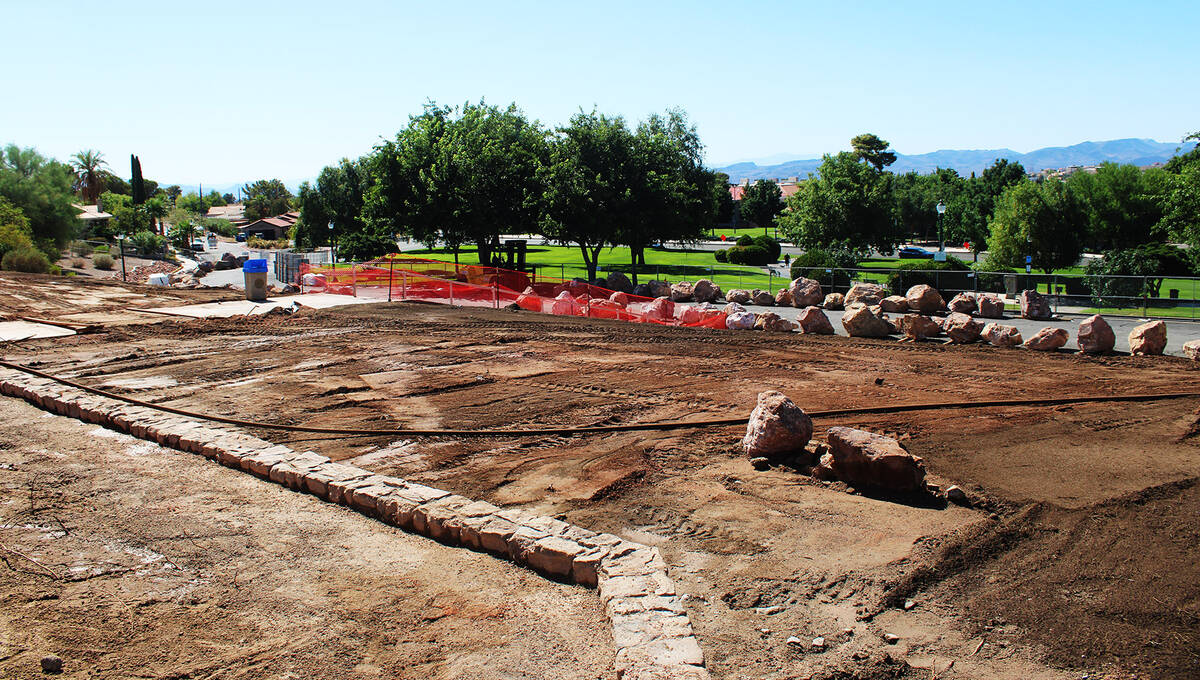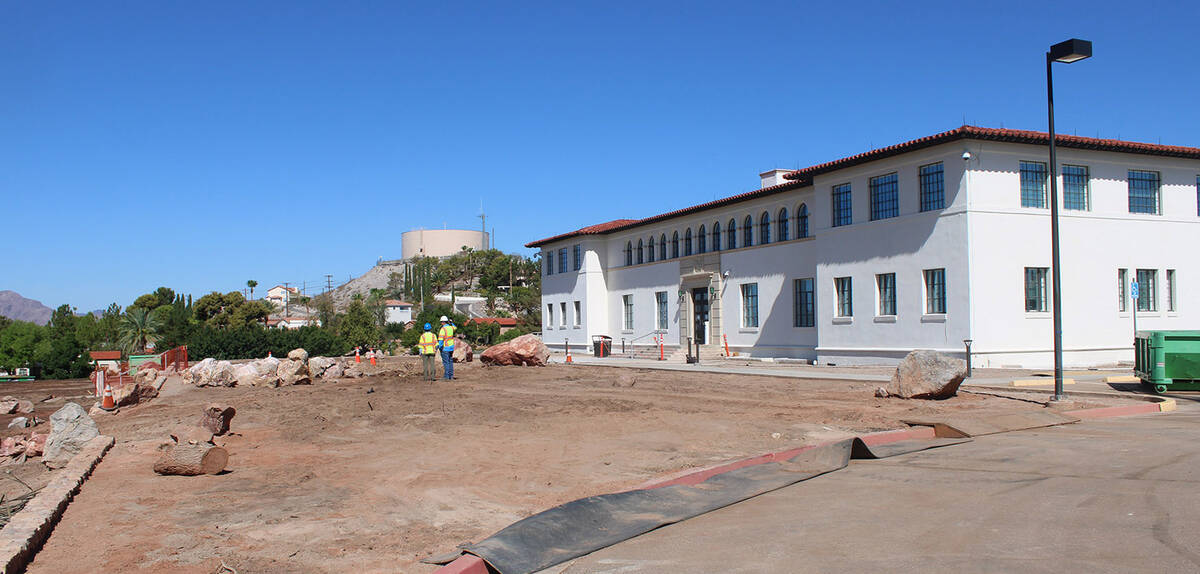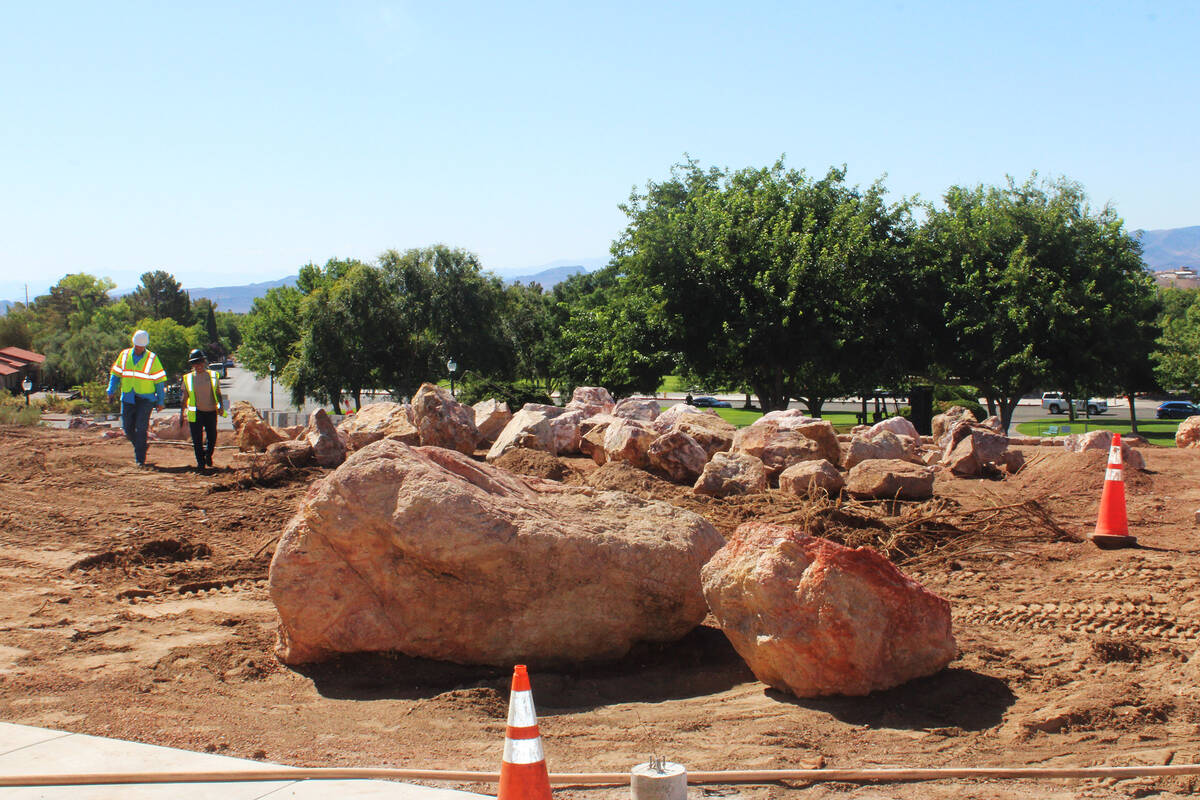Xeriscaping continues at BOR office
Clean, Green Boulder City is now a little less green, but according to officials from the Bureau of Reclamation, it’s for a good cause, saving more than two million gallons of water a year.
Those who have driven by the Bureau’s offices lately have seen that the grassy hill is no longer that. Instead, the hill is now dirt and boulders as the next phase of work is underway to turn the hill into a xeriscape setting. Xeriscaping is the practice of designing landscapes to reduce or eliminate the need for irrigation so little or no water beyond what the natural climate provides is necessary.
The $4.5 million project, funded by the Bipartisan Infrastructure Law, will replace the lawn and associated turf surrounding the facilities with low-water usage vegetation, including drought-tolerant and native trees, shrubs, and plants.
When completed, the regional office grounds will feature a meandering path surrounded by small groves of native plants, trees, and shrubs. Construction for the xeriscape project is scheduled to continue through October.
Last week, BOR Public Affairs Specialist Doug Hendrix and Lower Colorado Basin Regional Engineer Tonya Hart discussed the progress of the project and community feedback.
Work began on the project in May and prior to that the public was invited to attend an open house to talk with BOR officials and see a conceptual design. That design has since been changed somewhat but the majority of the plan remains in place. Prior to proceeding, the BOR worked with the Nevada State Historic Preservation Office in order to receive its analysis of the proposed work. They also worked closely with the Boulder City Historic Preservation Commission as well as the National Park Service.
“We get that this is a very historical property,” Hendrix said. “That’s not lost on us. That’s the reason we’re taking our time and inviting feedback through the entire process. We want to make sure the community is fully onboard as we move forward.”
Over the years, several types of grass were planted on the hill, including Bermuda, which can have a root system eight feet deep.
“So, if you don’t remove and kill the entire root system, it will come back,” Hart said. “Even from small pieces of root, it will regenerate and regrow. For the herbicide to be effective in killing the Bermuda grass, you have to make sure the Bermuda grass is thriving. So, we had to irrigate the grass to get it green. In order for that to happen, the overnight lows have to be above 65 degrees. And because we had such a cool spring and early summer, it delayed the project a bit.”
The project is still in the demolition phase, which should be finished this week and rough grading will begin. The hill will be more gradual than in the past to accommodate the trail that will meander through the xeriscape. Other amenities will include elevated community gathering spots and interpretive signs profiling the historic significance of the building and native vegetation placed at the site.
Huge boulders, which were brought in, will be placed throughout the hill, which will take at least two weeks to complete. This will help with erosion and runoff. Irrigation will then be installed but the plants won’t go in until October to ensure they‘re are thriving and not overstressed by the heat. In the process, the BOR will be switching from municipal water for the irrigation to raw water.
Both said that when the project of removing the grass was first announced, the news didn’t go over well with some.
“Initially, it was a mix of curiosity and approval, frustration or flat-out anger,” Hart said.
Hendrix added, “When we were taking out the grass and removing the trees, we were changing a viewshed that had been there for 75 years. People were asking why. Now, I think they’re seeing progress, and getting the fact we’re going to be bring something very tasteful back in.”
They also acknowledged that early on, some were concerned that the grass removal was going to extend to Wilbur Square, which is owned by the city and not the government. The city is, however, looking at portions of its parks and golf courses where grass can be removed to reduce water usage.
“This aligns us with Nevada state law, which requires all non-functional turf to be removed,” Hart said. “Because our lawn was not a park, it falls under that category. In addition, as the water master for the Colorado River and lower basin, we need to be an example and good stewards of our water.”


















